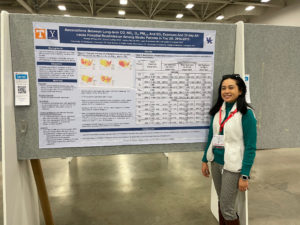Findings Presented at 2023 International Stroke Conference
Story by Macy Roberts, CEHHS Student News Reporter, Class of 2024
Earlier this month, Phoebe Tran, an assistant professor in the College of Education, Health and Human Sciences at the University of Tennessee, Knoxville, represented the Department of Public Health at the American Heart Association’s 2023 International Stroke Conference. The purpose of Tran’s research was to demonstrate the association between exposure to common air pollutants and hospital readmissions for previous stroke patients.

Phoebe Tran shares results of recent research on the correlation between pollution and stroke patient hospitalizations.
The research Tran presented was conducted on original Medicare beneficiaries 65 and older who were discharged from hospitals after suffering from ischemic strokes during the years 2014 and 2015. Results of the study accounted for differences in geographical regions by linking air pollution data to the patients’ counties of residence.
Ultimately, Tran concluded that the association between long-term exposure to air pollutants and 30-day hospital readmissions is significant. Her analysis revealed that 12.5% of the stroke patients were readmitted within 30 days of exposure to common air pollutants including carbon monoxide, nitrogen dioxide, ozone, particulate matter 2.5 and sulfur dioxide. Additional research needs to be conducted on whether improving air quality can reduce these post-stroke hospital readmissions.
Regarding her students, Tran said she hopes they pull two main takeaways from the work she presented at the International Stroke Conference: the importance of drawing research ideas from the community around them, as well as the importance of collaboration.
“Public health is an implementation-focused field … whenever I begin a research project, I ask myself how the findings from my work can be used to help improve the health of people in my city, state and region,” Tran said. “I make it a point to tell my students that collaborating with others who are outside the public health field can help introduce them to perspectives and techniques that can enhance their existing research and skillset.”
Tran’s research on long-term air pollutants and stroke re-hospitalizations can be found in the academic journal Stroke. In the future, Tran plans on revisiting how environmental factors impact cardiovascular disease re-hospitalization. As for now, Tran’s current research focuses on secondary cardiovascular disease in underserved communities.
“I am very happy to be able to represent the Department of Public Health and UT in the stroke research field,” Tran said. “I am excited by the many resources available at UT that will allow me to conduct this type of work.”
Tran holds a PhD in Epidemiology from Yale University. Her interest in cardiovascular disease research blossomed from her experiences growing up in Tennessee and volunteering in rural Appalachia.
“Many parts of rural Appalachia also overlap with the Stroke-Belt, creating a scenario where there are high stroke rates in medically underserved areas,” Tran said. “My research seeks to help rural Appalachian residents have an improved quality of life when they return to their homes and community following a heart attack or stroke.”
Attending the International Stroke Conference in-person was always a goal of Tran’s. The conference provides a space for investigators to share their research interests and provide feedback to each other. By bringing like-minded researchers together, the International Stroke Conference presents opportunities for collaboration and partnerships that may not be formed otherwise.
Through its eight departments and 12 centers, the UT Knoxville College of Education, Health, and Human Sciences enhances the quality of life for all through research, outreach, and practice. Find out more at cehhs.utk.edu